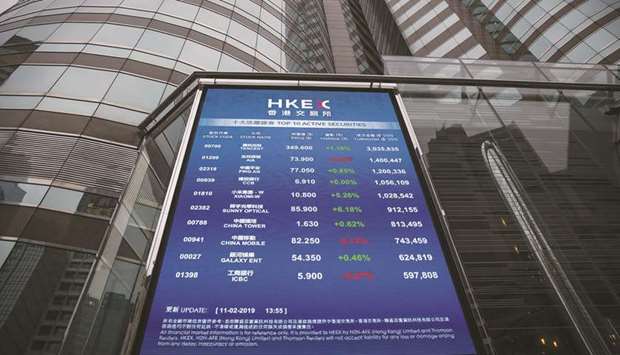Hong Kong stocks tumbled yesterday after the city’s credit rating was downgraded over its response to months of sometimes violent protests, while investors were also spooked by a deadly Sars-like virus that has been confirmed to be transmitted between humans.
With US markets closed for a holiday, traders struggled to find fresh catalysts to continue a long-running rally fuelled by the China-US trade pact, lowered Brexit tensions, central bank easing and an improving global outlook.
Hong Kong was the standout yesterday, plunging 2.8% to 27,985.33, a day after Moody’s said it had lowered its rating in a fresh blow to the financial hub, which has likely fallen into recession owing to the unrest as well as the China-US trade war.
In a statement, the firm said: “The absence of tangible plans to address either the political or economic and social concerns of the Hong Kong population that have come to the fore in the past nine months may reflect weaker inherent institutional capacity than Moody’s had previously assessed.”
The move comes as the business community grows increasingly worried that the features that give Hong Kong more political and economic autonomy are weakening under pressure from Beijing.
The decision came four months after a similar move by Fitch, which cited the demonstrations and uncertainty caused by closer integration with the Chinese mainland.
Among other markets, Tokyo ended 0.9% lower at 23,864.56, while Shanghai, Singapore, Seoul and Manila all sank more than 1%. Sydney lost 0.2%, while Mumbai, Bangkok and Jakarta were also in the red.
There is a growing unease about the spread of a virus from the Chinese city of Wuhan, which has now claimed four lives and infected more than 200.
The new coronavirus strain has caused alarm because of its connection to Severe Acute Respiratory Syndrome (Sars), which killed nearly 650 people across mainland China and Hong Kong in 2002-2003.
It also comes as China prepares for the Lunar New Year holiday, which sees hundreds of millions of people travel across the country, with a top scientist at the country’s National Health Commission saying the virus has now been found to pass between humans.
The World Health Organisation will meet today to determine whether to declare the outbreak “a public health emergency of international concern” — a rare designation only used for the gravest epidemics.
Cities across Asia have ramped up their defences, with mandatory screenings at airports of arrivals from high-risk areas of China after cases were reported in Thailand, Japan and South Korea.
AxiCorp analyst Stephen Innes said the latest developments were “a building concern”.
“The cost to the global economy can be quite staggering in negative GDP terms if this outbreak reaches epidemic proportions as until this week, the market was underestimating the potential of the flu spreading,” he said in a note.
“But it’s an essential enough development that the market will continue to monitor on the risk radar, as if things turn critical it could provide a massive blow to the airline industry and a knockout punch to local tourism.”
Tourism-linked shares plunged in Hong Kong, with Cathay Pacific losing more than 4% and casino operator Wynn Macau down 4.8%.
The nervousness on trading floors saw investors shift out of higher-yielding, riskier currencies with the dollar up against the South Korean won, the Australian dollar and the Indonesian rupiah, among others.
But the greenback retreated against the safe-haven yen, while gold, another go-to asset in times of uncertainty, was also up.
While there is a general optimism that the world economic slowdown is easing, the International Monetary Fund said in its latest outlook report that it expected global growth to come in slightly weaker than previously forecast this year and next.

A screen displays stock figures of the top 10 active securities outside the Exchange Square complex, which houses the Hong Kong Stock Exchange (file).
